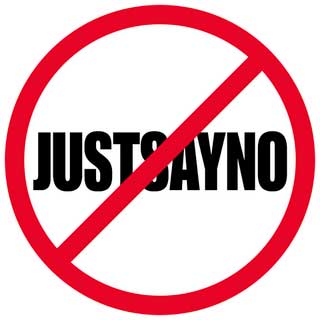Dope Pushin’
If you’re like me, you are old enough to have lived through the debut of Debbie Gibson’s Electric Youth album, the fall of the Berlin wall,the three-year window where wearing two pairs of brightly colored tube socks was acceptable, and the American Drug Panic of the 1980s. With the advent of crack and crack cocaine the country was in a real tizzy and for good reason; the South Bronx and other urban areas were engulfed in practically epidemic levels of drug usage and so the logical explanation was to target young, suburban American young people, to ensure that they Just Said No.
We all probably have a vague recollection of sitting in an elementary school classroom, shades drawn, watching a filmstrip about dope, or sitting at home on the couch watching an anti-drug PSA commercial, with only a vague, shadowy sense of what drugs were. And then of course there was D.A.R.E., the brilliant campaign designed to keep youngsters away from drugs by having monotonous old police officers tell them horror stories. Or something. I don’t know because my class’s D.A.R.E officer broke his ankle the week before we were supposed to start the program and apparently, there were no other officers available in the entire north Jersey area capable of daring to keep me and my classmates off drugs. So aside from providing many 20-something’s with a free ironic T-shirt, the program didn’t do much for anybody’s life.
Various Public Service Announcement’s warned me that sick, twisted individuals (teengaers and young adults, all) were desperate to get young kids with no money and no valuables hooked on drugs for reasons too sinister to even explain to us . By the age of nine, I knew who to watch out for: the shady looking kid in a flannel shirt and leather jacket with a bandanna tied round his head. He’d most likely be standing around, shifty eyed by a schoolyard fence, or in an empty lot, staringinto the distance with a cold, evil expression before telling me he had something awesome that I “just gotta try”. But I’d be ready, armed with one of the countless streetwise comebacks that the American Council for Drug Education had thoughtfully provided me with.
“Users are Losers!”
“This is your brain on drugs!!”
“I’m not a chicken, you’re a turkey!”
This final one –a pre-planned attack on anyone who dared to confuse my refusal to poison my body and mind with some kind of cowardice– I would deliver with such scorn and disgust, and such a defiant shifting of my pink denim backpack that the derelict drug pusher would have no choice but to slink into the shadows and find another neighborhood to pervert.
The media convinced me that it was these darkened, depraved individuals preying on the weak minds of the young that would be the ones foisting free drugs upon me despite fevered protests, so it was certainly a rude awakening to get to college only to discover that I’d have to buy the stuff off rich kids from New England.
In recent years the media has attempted to inject a kind of street-wise savvy into their anti-drug messages. Perhaps they realized that the early campaigns were useless and if anything, helped young people feel more comfortable about buying drugs once they realized they could get pot and mushrooms from their brother’s hot roommates, and not from a scar-faced burnout in the urine soaked alley behind the Coconut Records. Whatever the reasoning, things have taken a decidedly more youthful turn in recent years. However these commercials still seem to be written and directed by someone who’s never smoked pot before. For example:
Above The Influence – DOG TALKING MARIJUANA AD ONDCP
Now I’m no Hunter S. Thompson, but my guess is that if she’s seeing her dog talk in what sounds suspciously like Ron Howard’s voice, she did a little more than smoke a joint that afternoon.
There’s another one where the kid runs over his brother, or lets him drown or something, and then yet another ad where after smoking pot a kid “accidentally” shoots his friend. These are all tasks requiring far too much physical effort and commitment for any of the stoned people I’ve ever encountered but maybe I just have lazy friends.
However below is what I believe to be the most absurd, least practical and bizarre anti-marijuana ad ever conceived for public consumption. Behold:
First of all, who is this kid whose friends are begging him to smoke their weed? Um, hi, can I hang out, too? Also , this commercial begs the question: What in the fuck is a lumberyard dog? Seriously? Is this a common figure in the neighborhood? Have I been living in The Big City for so long now that I’ve failed to realize that the Lumberyard Dog is a beloved community figure like the milkman or the town drunk?
Wow, AdWizards, thanks for creating a scenario that I can relate to.
A few years ago South Park ran an episode called My Future Self ‘N” Me in which the parents, worried about drug use, hire actors to pretend to be the kids future selves as junkie deadbeats, in order to scare them away from ever using drugs. The plan doesn’t work and eventually Stan’s dad explains that they did it because they were worried that their kids would get exposed to drugs and mess up their lives. He goes on to explain that it’s not that smoking pot will kill you or necessarily destroy your life with no exceptions, but it can make you ok with being bored, never trying to achieve anything and never growing as a person, a fate far more realistic if less dramatic, than any of the extreme consequences posited by the media.
Check out their commentary here:




